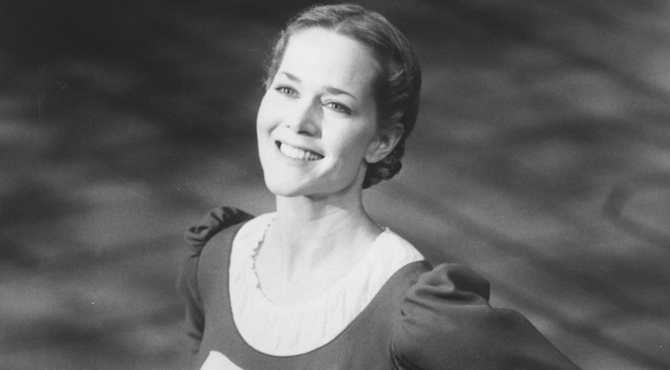Rebecca Luker, the actress and singer who in a lauded three-decade career on the New York stage embodied the essence of the Broadway musical ingénue in hit revivals of “Show Boat,” “The Sound of Music” and “The Music Man,” died on Wednesday in a hospital in Manhattan. She was 59.
The death was confirmed by Sarah Fargo, her agent. Ms. Luker announced in February that she had amyotrophic lateral sclerosis, commonly known as A.L.S. or Lou Gehrig’s disease.
Ms. Luker’s Broadway career, fueled by her crystal-clear operatic soprano, brought her three Tony Award nominations. The first was for “Show Boat” (1994), in which she played Magnolia, the captain’s dewy-fresh teenage daughter, whose life is ruined by marriage to a riverboat gambler. The second was for “The Music Man” (2000), in which she was Marian, the prim River City librarian who enchants a traveling flimflam man who thinks — mistakenly — that he’s just passing through town.

In between, Ms. Luker delighted critics by playing against type in a 1997 Encores! production of “The Boys From Syracuse.” As Adriana, the neglected wife who gets her groove back (with her husband’s long-lost twin brother), she wore slinky 1930s gowns and exuded what Ben Brantley, in his review for The New York Times, called “a disarmingly confectionary sexiness.”
Playing Adriana was fun, Ms. Luker admitted. “For the first time in my life, I got to do a bit,” she told The Times in 1998. “Learning to turn to the audience, learning to hold for laughs — I ate it up with a spoon.”
But by the end of that year, she was deep into ingénue territory again, playing Maria, the undisciplined novice nun turned live-in governess of seven, in “The Sound of Music.”
When she earned her third Tony nomination, this one for best featured actress in a musical, it was for playing Winifred Banks, a married Englishwoman with two children and a gifted nanny, in “Mary Poppins” (2006).

For all her success in musicals, Ms. Luker did not identify as a show-tunes type. “I am so not a musical theater person,” she told Playbill in 2003. “I love rock music and jazz. I love the ’70s stuff I grew up with.”
Rebecca Joan Luker was born on April 17, 1961, in Birmingham, Ala., and grew up in Helena, a small town nearby. She was one of four children of Norse Doak Luker Jr., a construction worker, and Martha (Baggett) Luker, the local high school’s treasurer. Rebecca sang in her church choir (First Baptist of Alabaster) and was a member of the Thompson High marching band.
In high school, she entered a beauty pageant. Singing “Much More,” the ballad of girlish dreams and determination from “The Fantasticks,” she won a college scholarship as first runner-up to Alabama’s Junior Miss.
That took her to the University of Montevallo, just 14 miles from her parents’ home, where she was a music major and received her diploma in 1984. Graduation was a year later than planned because she took a break to work with Michigan Opera Theater, where she met her future New York agent. Just five years after college, she was on the Broadway stage, assuming the lead female role in “The Phantom of the Opera”— Christine, the chorus girl who is the object of the phantom’s affections.

“Phantom” was her Broadway debut; she began as the understudy to the original star, Sarah Brightman; became an alternate; and took over as Christine in 1989. She remained with the show until 1991.
Ms. Luker moved on immediately to another Broadway show: She played a ghost, the little orphan girl’s dead Aunt Lily, in “The Secret Garden.” In his review in The Times, Frank Rich singled out “I Heard Someone Crying,” Ms. Luker’s haunting trio with Mandy Patinkin and Daisy Egan, for special praise.
In several of her later Broadway roles, Ms. Luker replaced the original actress in a long-running hit. She took over as Claudia, the director-protagonist’s movie-star muse, in “Nine” (2003); Marie, the temperamental fairy godmother, in “Cinderella” (2013); and Helen, the frustrated wife and mother who misses being an actress — just as Mrs. Banks had in “Mary Poppins” — in “Fun Home” (2016).
She grew older gracefully in a number of her later Off Broadway roles. Twenty years after starring in a 1996 revival of “Brigadoon” as Fiona, a Scottish lass so rare she really does come along only once a century, she played a droll Buffalo matron in A.R. Gurney’s comic drama “Indian Blood” (2006). In 2011, she was an Italian duchess grieving her son’s death in the musical “Death Takes a Holiday,” by Maury Yeston, Thomas Meehan and Peter Stone.
Ms. Luker also had a thriving cabaret career, appearing at intimate venues like Café Carlyle and Feinstein’s/54 Below, but she professed a special love for “the live experience in front of an orchestra.”
The stage was always her first home, but she did finally make her screen acting debut in her late 30s when she appeared in “Cupid and Cate” (2000), a Hallmark Hall of Fame television movie in which she played the heroine’s perfect and perfectly sensible sister. Between 2010 and 2020, she had guest roles on series including “Boardwalk Empire” and “N.C.I.S. New Orleans” and appeared in three feature films, including “Not Fade Away” (2012), a drama about a teenage rock band.

Her final stage role was as a small-town minister’s narrow-minded wife in a 2019 Kennedy Center production of “Footloose.” She performed at a concert in honor of the lyricist Sheldon Harnick in March 2020.
Her last performance was in June, via Zoom, in a prerecorded benefit performance, “At Home With Rebecca Luker.”“When I sing,” she told The Times shortly before that show, “I think it heals me. It helps me feel like I’m still a part of something.”
Ms. Luker married Gregory Jbara, an actor, in 1993; they divorced in 1996. In 2000 she married the actor Danny Burstein, whom she met when they starred together in “Time and Again” in San Diego.
Mr. Burstein survives her, as do two stepsons, Zachary and Alexander Burstein; a brother, Roger; a sister, Suzanne Luker; her mother, Martha Hales; and her stepfather, Lamar Hales. Another brother, Stephen, died last year.
Looking back on her career in a 2016 Theater People podcast, Ms. Luker expressed gratitude for the roles she’d had but admitted that she probably should have broken out of the leading-lady mold — studied acting longer and more seriously, appeared in more plays, done more comedy.
“I wish I had branched out a little more,” she said cheerily. “Maybe played a bitch or something.”










